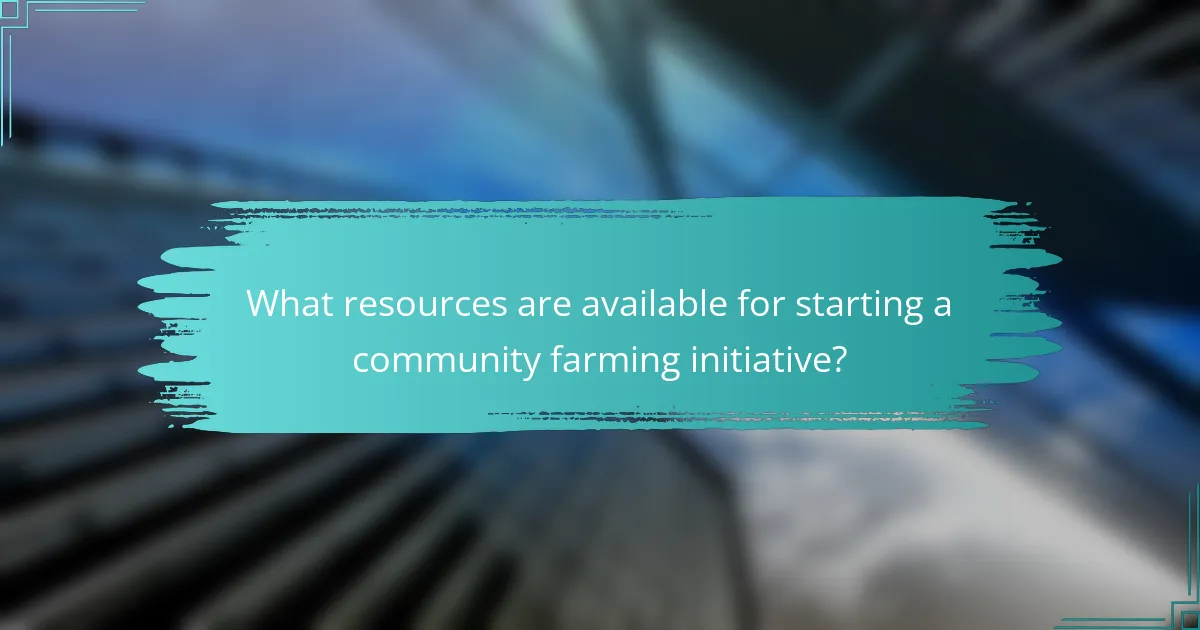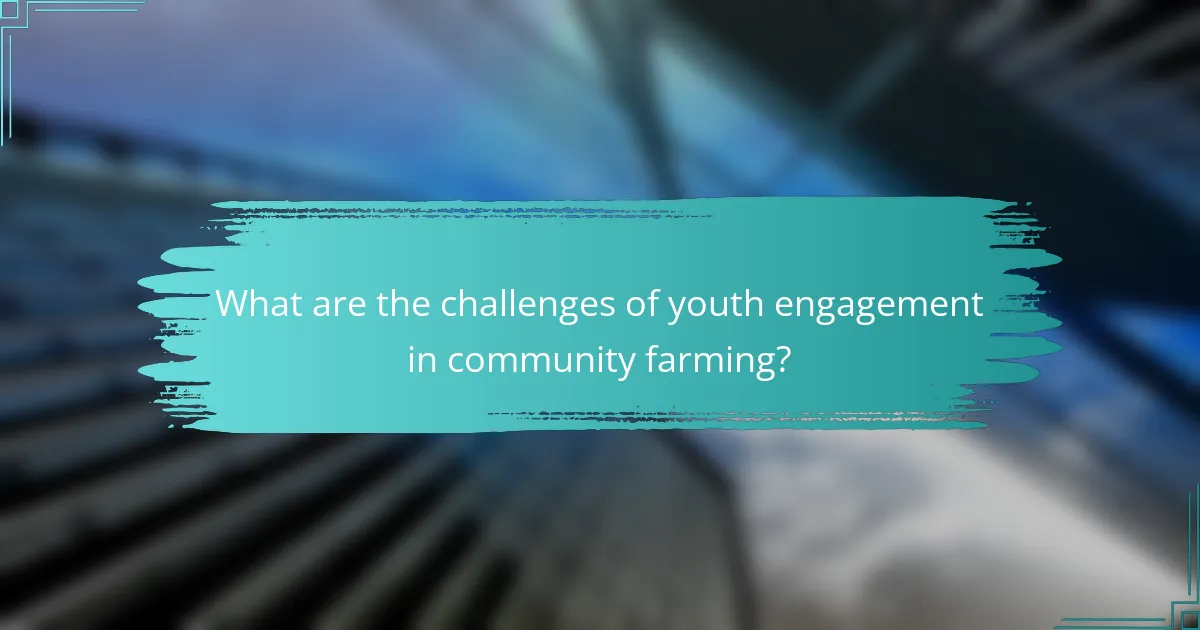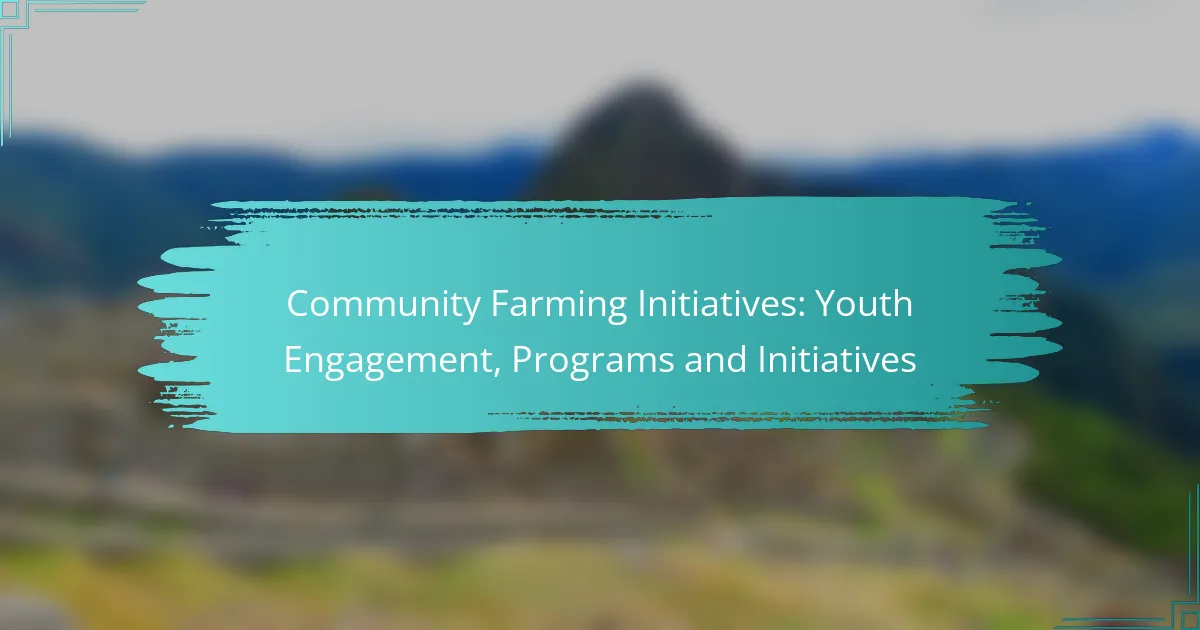Community farming initiatives offer youth a unique opportunity to engage in hands-on agricultural activities that promote education, sustainability, and community involvement. Through these programs, young people not only acquire practical farming skills but also develop a sense of responsibility and connection to their environment, fostering personal growth and social connections.

How can youth engage in community farming initiatives?
Youth can engage in community farming initiatives through various programs that promote hands-on learning and active participation. These initiatives not only provide practical farming experience but also foster a sense of community and environmental stewardship among young people.
Volunteer programs
Volunteer programs are a great way for youth to get involved in community farming. These programs typically require a commitment of a few hours each week and can include tasks like planting, weeding, and harvesting crops. Many local farms and community gardens welcome volunteers, often providing training and support.
Participating in volunteer programs can help youth develop skills in agriculture, teamwork, and responsibility. It’s advisable to check local listings or community boards for opportunities that match their interests and availability.
School partnerships
School partnerships with community farms can enhance educational experiences for students. These collaborations often involve integrating farming activities into the curriculum, allowing students to learn about nutrition, sustainability, and biology through hands-on experiences.
Schools can benefit from these partnerships by organizing field trips to local farms or creating school gardens. Engaging students in these activities can foster a deeper understanding of food systems and environmental issues.
Workshops and training sessions
Workshops and training sessions provide youth with specialized knowledge and skills in farming practices. These sessions may cover topics such as organic farming, permaculture, and pest management, often led by experienced farmers or agricultural experts.
Many community organizations offer free or low-cost workshops, making them accessible to young people. Participating in these sessions can empower youth to take on leadership roles in their communities and promote sustainable practices.
Internship opportunities
Internship opportunities in community farming allow youth to gain practical experience while working alongside professionals in the field. These internships can vary in duration, often ranging from a few weeks to several months, and may include stipends or academic credit.
Interns typically engage in a variety of tasks, from crop management to marketing produce. It’s beneficial for youth to seek out internships that align with their career interests and provide mentorship opportunities for future endeavors in agriculture or environmental science.

What are successful community farming programs for youth?
Successful community farming programs for youth engage young people in hands-on agricultural activities while promoting education, sustainability, and community involvement. These initiatives often blend farming with skill development, fostering a sense of responsibility and connection to the environment.
Urban Roots in Austin
Urban Roots focuses on empowering young people through sustainable farming practices in Austin, Texas. The program offers internships where youth learn about agriculture, nutrition, and leadership while growing fresh produce for local food banks.
Participants typically engage in hands-on activities such as planting, harvesting, and selling produce at farmers’ markets. This not only builds agricultural skills but also enhances their understanding of food systems and community health.
Green Bronx Machine in New York
Green Bronx Machine aims to improve the health and well-being of students in the Bronx by integrating farming into the educational curriculum. The initiative teaches students how to grow food in urban settings, emphasizing nutrition and healthy eating habits.
Through classroom learning and hands-on gardening, students gain practical skills and knowledge about sustainable practices. The program also encourages community involvement by connecting students with local markets and restaurants.
Growing Power in Milwaukee
Growing Power is a community farming initiative in Milwaukee that focuses on urban agriculture and youth development. The program provides training and resources to young people, teaching them how to cultivate food sustainably in urban environments.
Participants learn about aquaponics, organic farming, and food justice, which empowers them to become advocates for healthy food access in their communities. The initiative often collaborates with local schools to integrate farming into educational programs, enhancing students’ learning experiences.

What benefits do youth gain from community farming?
Youth participating in community farming gain numerous benefits, including practical skills, social connections, and enhanced awareness of nutrition and environmental issues. Engaging in these initiatives fosters personal growth and community involvement, making a positive impact on both individuals and their neighborhoods.
Skill development
Community farming provides youth with hands-on experience in various agricultural practices, such as planting, harvesting, and maintaining crops. These activities help them develop essential skills like teamwork, problem-solving, and time management. Additionally, they learn about sustainable farming techniques, which can be valuable in future career paths.
Workshops and training sessions often accompany community farming projects, offering opportunities to learn about business management, marketing, and food preparation. This combination of skills prepares young people for diverse roles in the agricultural sector and beyond.
Community building
Participating in community farming fosters a sense of belonging among youth, as they work alongside peers and local residents. This collaborative environment encourages friendships and strengthens community ties, which can lead to increased civic engagement. Young people often take pride in contributing to local food systems and supporting their neighborhoods.
Through shared experiences, youth can develop leadership skills and a sense of responsibility. These initiatives often involve organizing events, managing resources, and communicating with community members, all of which enhance their social capabilities.
Nutritional education
Community farming initiatives often include educational components that teach youth about healthy eating and the importance of nutrition. Participants learn how to grow their own food, which can lead to better dietary choices and an understanding of where food comes from. This knowledge empowers them to make informed decisions about their health.
Workshops may cover topics such as meal planning, cooking techniques, and the benefits of consuming fresh produce. By connecting youth with local food sources, these programs help instill lifelong habits that promote well-being and reduce reliance on processed foods.
Environmental awareness
Engaging in community farming helps youth develop a deeper understanding of environmental issues, such as sustainability and biodiversity. They learn about the impact of agricultural practices on ecosystems and the importance of preserving natural resources. This awareness can inspire them to advocate for eco-friendly practices in their communities.
Many community farming projects incorporate lessons on composting, water conservation, and organic gardening. By actively participating in these practices, youth gain practical knowledge that encourages them to adopt environmentally responsible behaviors in their daily lives.

What resources are available for starting a community farming initiative?
Starting a community farming initiative can be supported through various resources, including grants, local government programs, and nonprofit partnerships. These resources can provide financial assistance, technical support, and community engagement opportunities.
Grants and funding opportunities
Grants and funding opportunities are essential for launching community farming initiatives. Organizations like the USDA offer grants specifically for community agriculture projects, which can cover equipment, seeds, and educational programs. Local foundations may also provide funding tailored to community development and sustainability.
When applying for grants, ensure your proposal clearly outlines your project’s goals, community benefits, and sustainability plans. Consider seeking funding from multiple sources to diversify your financial support and increase your chances of success.
Local government support
Local governments often provide support for community farming through programs that promote urban agriculture and food security. This can include access to public land for farming, technical assistance, and resources for community engagement. Check with your city or county agricultural office for specific programs available in your area.
Engaging with local officials can also help navigate zoning regulations and obtain necessary permits for your initiative. Building relationships with local government can lead to additional resources and support as your project develops.
Nonprofit partnerships
Partnering with nonprofits can enhance the effectiveness of community farming initiatives. Many nonprofits focus on food justice, environmental sustainability, and community development, offering expertise and resources that can benefit your project. Collaborating with these organizations can also help in outreach and volunteer recruitment.
When seeking partnerships, look for nonprofits that align with your mission and values. Establish clear roles and responsibilities to ensure a productive collaboration, and consider joint fundraising efforts to maximize resources for both parties.

What are the challenges of youth engagement in community farming?
Youth engagement in community farming faces several challenges, including a lack of resources, limited access to land, and community resistance. These obstacles can hinder the ability of young people to participate effectively in agricultural initiatives.
Lack of resources
Many youth-led community farming initiatives struggle due to insufficient resources, including funding, tools, and educational materials. Without financial support, young farmers may find it difficult to acquire necessary equipment or seeds, which can limit their ability to start or maintain projects.
To overcome this challenge, organizations can seek grants or partnerships with local businesses to provide resources. Engaging in crowdfunding campaigns can also help gather financial support from the community.
Limited access to land
Access to land is a significant barrier for youth interested in community farming. Many young people do not have the means to purchase or lease land, which restricts their ability to grow crops or raise animals. Urban areas often face even more severe limitations due to high real estate costs.
Community gardens or shared farming spaces can provide a solution by allowing multiple individuals to utilize a single plot of land. Local governments and non-profits can facilitate these initiatives by identifying underused land for community farming projects.
Community resistance
Community resistance can arise from skepticism about the capabilities of youth in farming roles or concerns about changes to local land use. Older generations may be hesitant to support new initiatives, fearing disruption to traditional practices.
Building relationships with community members through open dialogue and showcasing successful youth-led projects can help alleviate these concerns. Organizing community events that involve both youth and older residents can foster collaboration and mutual understanding.
